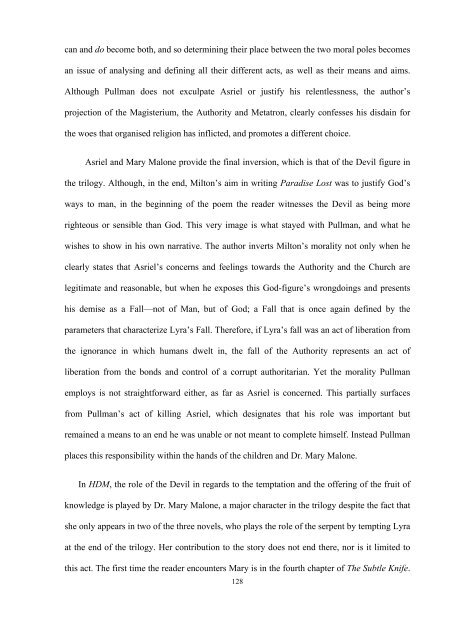The secular angel in contemporary children's literature: David ...
The secular angel in contemporary children's literature: David ...
The secular angel in contemporary children's literature: David ...
Create successful ePaper yourself
Turn your PDF publications into a flip-book with our unique Google optimized e-Paper software.
can and do become both, and so determ<strong>in</strong><strong>in</strong>g their place between the two moral poles becomes<br />
an issue of analys<strong>in</strong>g and def<strong>in</strong><strong>in</strong>g all their different acts, as well as their means and aims.<br />
Although Pullman does not exculpate Asriel or justify his relentlessness, the author’s<br />
projection of the Magisterium, the Authority and Metatron, clearly confesses his disda<strong>in</strong> for<br />
the woes that organised religion has <strong>in</strong>flicted, and promotes a different choice.<br />
Asriel and Mary Malone provide the f<strong>in</strong>al <strong>in</strong>version, which is that of the Devil figure <strong>in</strong><br />
the trilogy. Although, <strong>in</strong> the end, Milton’s aim <strong>in</strong> writ<strong>in</strong>g Paradise Lost was to justify God’s<br />
ways to man, <strong>in</strong> the beg<strong>in</strong>n<strong>in</strong>g of the poem the reader witnesses the Devil as be<strong>in</strong>g more<br />
righteous or sensible than God. This very image is what stayed with Pullman, and what he<br />
wishes to show <strong>in</strong> his own narrative. <strong>The</strong> author <strong>in</strong>verts Milton’s morality not only when he<br />
clearly states that Asriel’s concerns and feel<strong>in</strong>gs towards the Authority and the Church are<br />
legitimate and reasonable, but when he exposes this God-figure’s wrongdo<strong>in</strong>gs and presents<br />
his demise as a Fall—not of Man, but of God; a Fall that is once aga<strong>in</strong> def<strong>in</strong>ed by the<br />
parameters that characterize Lyra’s Fall. <strong>The</strong>refore, if Lyra’s fall was an act of liberation from<br />
the ignorance <strong>in</strong> which humans dwelt <strong>in</strong>, the fall of the Authority represents an act of<br />
liberation from the bonds and control of a corrupt authoritarian. Yet the morality Pullman<br />
employs is not straightforward either, as far as Asriel is concerned. This partially surfaces<br />
from Pullman’s act of kill<strong>in</strong>g Asriel, which designates that his role was important but<br />
rema<strong>in</strong>ed a means to an end he was unable or not meant to complete himself. Instead Pullman<br />
places this responsibility with<strong>in</strong> the hands of the children and Dr. Mary Malone.<br />
In HDM, the role of the Devil <strong>in</strong> regards to the temptation and the offer<strong>in</strong>g of the fruit of<br />
knowledge is played by Dr. Mary Malone, a major character <strong>in</strong> the trilogy despite the fact that<br />
she only appears <strong>in</strong> two of the three novels, who plays the role of the serpent by tempt<strong>in</strong>g Lyra<br />
at the end of the trilogy. Her contribution to the story does not end there, nor is it limited to<br />
this act. <strong>The</strong> first time the reader encounters Mary is <strong>in</strong> the fourth chapter of <strong>The</strong> Subtle Knife.<br />
128
















